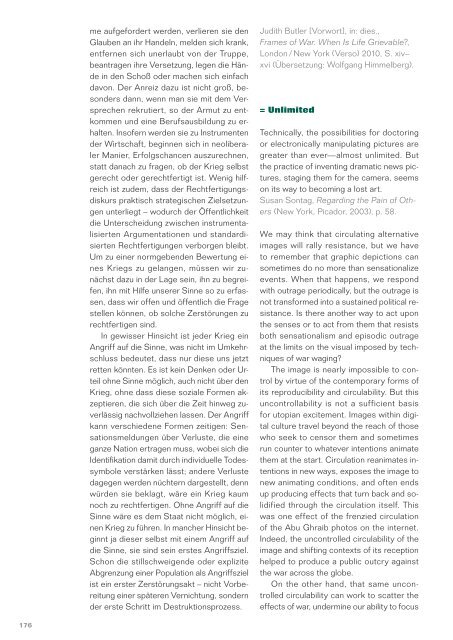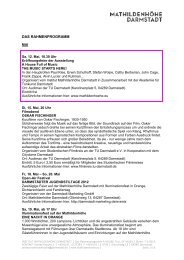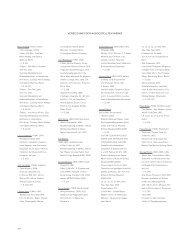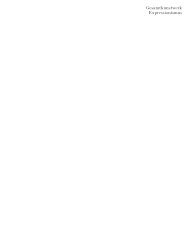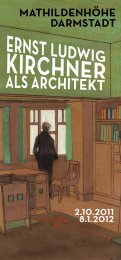Peggy Ahwesh Oliver van den Berg Wafaa Bilal ... - Mathildenhöhe
Peggy Ahwesh Oliver van den Berg Wafaa Bilal ... - Mathildenhöhe
Peggy Ahwesh Oliver van den Berg Wafaa Bilal ... - Mathildenhöhe
Sie wollen auch ein ePaper? Erhöhen Sie die Reichweite Ihrer Titel.
YUMPU macht aus Druck-PDFs automatisch weboptimierte ePaper, die Google liebt.
me aufgefordert wer<strong>den</strong>, verlieren sie <strong>den</strong><br />
Glauben an ihr Handeln, mel<strong>den</strong> sich krank,<br />
entfernen sich unerlaubt von der Truppe,<br />
beantragen ihre Versetzung, legen die Hände<br />
in <strong>den</strong> Schoß oder machen sich einfach<br />
davon. Der Anreiz dazu ist nicht groß, besonders<br />
dann, wenn man sie mit dem Versprechen<br />
rekrutiert, so der Armut zu entkommen<br />
und eine Berufsausbildung zu erhalten.<br />
Insofern wer<strong>den</strong> sie zu Instrumenten<br />
der Wirtschaft, beginnen sich in neoliberaler<br />
Manier, Erfolgschancen auszurechnen,<br />
statt danach zu fragen, ob der Krieg selbst<br />
gerecht oder gerechtfertigt ist. Wenig hilfreich<br />
ist zudem, dass der Rechtfertigungsdiskurs<br />
praktisch strategischen Zielsetzungen<br />
unterliegt – wodurch der Öffentlichkeit<br />
die Unterscheidung zwischen instrumentalisierten<br />
Argumentationen und standardisierten<br />
Rechtfertigungen verborgen bleibt.<br />
Um zu einer normgeben<strong>den</strong> Bewertung eines<br />
Kriegs zu gelangen, müssen wir zunächst<br />
dazu in der Lage sein, ihn zu begreifen,<br />
ihn mit Hilfe unserer Sinne so zu erfassen,<br />
dass wir offen und öffentlich die Frage<br />
stellen können, ob solche Zerstörungen zu<br />
rechtfertigen sind.<br />
In gewisser Hinsicht ist jeder Krieg ein<br />
Angriff auf die Sinne, was nicht im Umkehrschluss<br />
bedeutet, dass nur diese uns jetzt<br />
retten könnten. Es ist kein Denken oder Urteil<br />
ohne Sinne möglich, auch nicht über <strong>den</strong><br />
Krieg, ohne dass diese soziale Formen akzeptieren,<br />
die sich über die Zeit hinweg zuverlässig<br />
nachvollziehen lassen. Der Angriff<br />
kann verschie<strong>den</strong>e Formen zeitigen: Sensationsmeldungen<br />
über Verluste, die eine<br />
ganze Nation ertragen muss, wobei sich die<br />
I<strong>den</strong>tifikation damit durch individuelle Todessymbole<br />
verstärken lässt; andere Verluste<br />
dagegen wer<strong>den</strong> nüchtern dargestellt, <strong>den</strong>n<br />
wür<strong>den</strong> sie beklagt, wäre ein Krieg kaum<br />
noch zu rechtfertigen. Ohne Angriff auf die<br />
Sinne wäre es dem Staat nicht möglich, einen<br />
Krieg zu führen. In mancher Hinsicht beginnt<br />
ja dieser selbst mit einem Angriff auf<br />
die Sinne, sie sind sein erstes Angriffsziel.<br />
Schon die stillschweigende oder explizite<br />
Abgrenzung einer Population als Angriffsziel<br />
ist ein erster Zerstörungsakt – nicht Vorbereitung<br />
einer späteren Vernichtung, sondern<br />
der erste Schritt im Destruktionsprozess.<br />
Judith Butler [Vorwort], in: dies.,<br />
Frames of War. When Is Life Grievable?,<br />
London / New York (Verso) 2010, S. xiv–<br />
xvi (Übersetzung: Wolfgang Himmelberg).<br />
= Unlimited<br />
Technically, the possibilities for doctoring<br />
or electronically manipulating pictures are<br />
greater than ever—almost unlimited. But<br />
the practice of inventing dramatic news pictures,<br />
staging them for the camera, seems<br />
on its way to becoming a lost art.<br />
Susan Sontag, Regarding the Pain of Others<br />
(New York, Picador, 2003), p. 58.<br />
We may think that circulating alternative<br />
images will rally resistance, but we have<br />
to remember that graphic depictions can<br />
sometimes do no more than sensationalize<br />
events. When that happens, we respond<br />
with outrage periodically, but the outrage is<br />
not transformed into a sustained political resistance.<br />
Is there another way to act upon<br />
the senses or to act from them that resists<br />
both sensationalism and episodic outrage<br />
at the limits on the visual imposed by techniques<br />
of war waging?<br />
The image is nearly impossible to control<br />
by virtue of the contemporary forms of<br />
its reproducibility and circulability. But this<br />
uncontrollability is not a sufficient basis<br />
for utopian excitement. Images within digital<br />
culture travel beyond the reach of those<br />
who seek to censor them and sometimes<br />
run counter to whatever intentions animate<br />
them at the start. Circulation reanimates intentions<br />
in new ways, exposes the image to<br />
new animating conditions, and often ends<br />
up producing effects that turn back and solidified<br />
through the circulation itself. This<br />
was one effect of the frenzied circulation<br />
of the Abu Ghraib photos on the internet.<br />
Indeed, the uncontrolled circulability of the<br />
image and shifting contexts of its reception<br />
helped to produce a public outcry against<br />
the war across the globe.<br />
On the other hand, that same uncontrolled<br />
circulability can work to scatter the<br />
effects of war, undermine our ability to focus<br />
on its costs, and even naturalize the effects<br />
of war as a presupposed background of everyday<br />
life. This is a consequential metalepsis<br />
when the visual effects of war become<br />
the ground of everyday life. The destruction<br />
of our ability to focus is yet another form<br />
of collateral damage. As a result, intensified<br />
circulability cannot be affirmed as an unequivocal<br />
utopian effect of new visual technology,<br />
since the transmutation of ordinary<br />
life into the continuation of war is a clear and<br />
present risk.<br />
Indeed we must ask: Can there be the<br />
continuation of war or, indeed, the escalation<br />
of war, as we are now witnessing in Afghanistan,<br />
without first preparing and structuring<br />
the public understanding of what war<br />
is, and by attempting to suppress any visual,<br />
audible, or narrative accounts of war that<br />
might help to break open a popular resistance<br />
to war? Television coverage of war<br />
positions citizens as visual consumers of a<br />
violent conflict that happens elsewhere, at<br />
least in the United States where geographical<br />
distance from our so-called enemies allows<br />
us to wage war without close domestic<br />
scrutiny of our actions. It may be that<br />
global media operations like CNN actually<br />
export the perspective of the U.S., enforcing<br />
a sense of infinite distance from zones<br />
of war even for those who live in the midst<br />
of violence. But if the framing of what we<br />
see challenges the credibility of the claims<br />
made about war, then we fail to be effectively<br />
recruited into the war effort by the<br />
news. Indeed, if soldiers fail to be interpellated<br />
by the visual and narrative accounts<br />
of the wars they fight, then they start to<br />
loose faith in what they do, claim to be ill,<br />
go AWOL, request a transfer, stop working,<br />
or simply leave. The incentives to do<br />
this are not great, especially when soldiers<br />
are recruited with the promise of escaping<br />
poverty and acquiring job skills. In this way,<br />
they become instruments of the economy<br />
and begin in neo-liberal fashion to calculate<br />
their chances at success rather than ask<br />
whether the war is just or justified. It does<br />
not help that the discourse of justification<br />
has been effectively subordinated to strategic<br />
aims, at which point there is no operative<br />
public way to distinguish between<br />
instrumental forms of reasoning and normative<br />
justifications. To achieve a normative<br />
evaluation of a war, we have first to be<br />
able to take it in, to register war by the senses<br />
in ways that allow us openly and publicly<br />
to question whether such destruction is<br />
justifiable.<br />
In some sense, every war is a war upon<br />
the senses, which does not mean that, conversely,<br />
only the senses can save us now.<br />
There is no thinking and judgment without<br />
the senses, and there is no thinking and<br />
judgment about war without the senses assuming<br />
a social form that can be reliably reproduced<br />
over time. The assault can take<br />
various forms: rendering sensational losses<br />
that are borne by nations with whom i<strong>den</strong>tification<br />
is intensified through the individual<br />
icons of death, rendering insensate certain<br />
losses whose open mourning might<br />
challenge the rationale of war itself. Without<br />
the assault on the senses, it would be<br />
impossible for a state to wage war. Waging<br />
war in some ways begins with the assault<br />
on the senses; the senses are the first target<br />
of war. Similarly, the implicit or explicit<br />
framing of a population as a war target<br />
is the initial action of destruction. It is not<br />
just preparation for a destruction to come,<br />
but the initiating sequence of the process<br />
of destruction.<br />
Judith Butler, Frames of War. When Is Life<br />
Grievable? (London and New York, Verso,<br />
2010), pp. xiv-xvi.<br />
176 177


